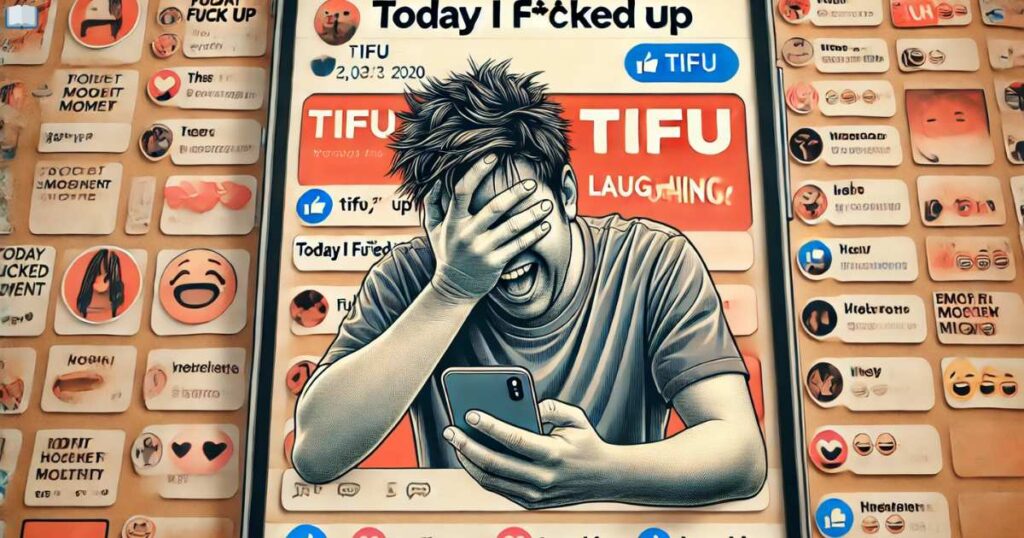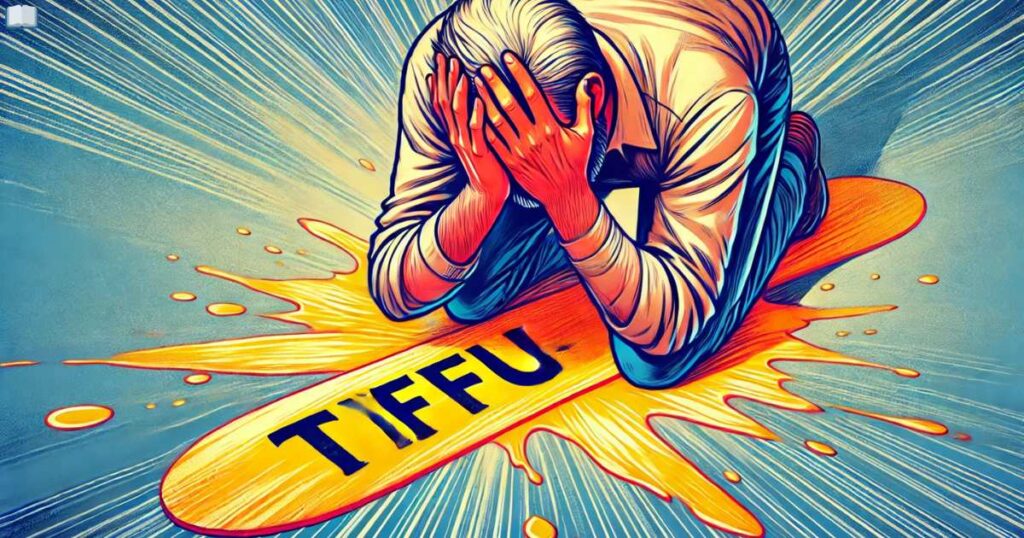If you’ve spent any time browsing Reddit or other online communities, you’ve likely come across the acronym TIFU. At first glance, it might seem like just another random jumble of letters, but it’s a term that carries a lot of weight in the realm of internet culture.
So, what does TIFU really mean, and why has it become such a popular part of online conversation, especially in 2025? Let’s dive in and explore its meaning, origins, and why it resonates so strongly with digital communities today.
What Does TIFU Really Mean?
TIFU stands for “Today I F*ed Up”**, an internet slang term used when someone admits to making a significant mistake. It’s a way for people to share their blunders, often in a humorous or self-deprecating way.
The term is most commonly used in online communities, particularly on Reddit’s r/tifu subreddit. Over time, it has expanded beyond text-based posts to videos, memes, and even corporate marketing strategies.
TIFU moments range from minor everyday slip-ups to major life-altering mistakes. The key element is that they are always unintended and often relatable, making them perfect for viral storytelling.
The History and Evolution of TIFU
The concept of sharing mistakes online isn’t new, but the TIFU acronym gained traction when Reddit launched the r/tifu subreddit in 2013. It quickly became one of the most popular places for users to confess their biggest blunders.
As social media platforms evolved, TIFU spread to places like Twitter, Instagram, and TikTok. Users started posting short videos and text-based confessions, making it easier than ever to share their mishaps.
By 2025, TIFU has become more than just a joke—it’s a cultural phenomenon. Even brands use it to acknowledge errors and turn them into viral moments that humanize their image.
Why Do People Share Their TIFU Moments?

One of the biggest reasons TIFU stories go viral is because people enjoy reading about others’ mistakes. But why do individuals willingly share their own embarrassing moments?
First, sharing mistakes can be therapeutic. Admitting a mistake and receiving support or laughter from strangers can reduce stress and anxiety. It’s a way to release guilt and move on from an awkward situation.
Second, people connect through shared experiences. When someone posts a TIFU story, readers often comment with similar experiences, making it a bonding moment. These posts remind us that everyone makes mistakes.
Lastly, TIFU stories entertain and educate. Some are simply hilarious, while others provide important life lessons. Readers not only get a good laugh but may also learn what not to do in similar situations.
Examples of Classic TIFU Moments
To understand what TIFU really means, let’s look at some examples of situations where people have truly “messed up.”
| TIFU Moment | Description | Why It’s Relatable |
| Sending the wrong text | A person accidentally sends a love confession to their boss instead of their partner. | Everyone has sent a message to the wrong person at some point. |
| Embarrassing public mistake | Someone waves at a stranger, thinking they know them, only to realize they don’t. | It’s a common social blunder that everyone dreads. |
| Cooking disaster | Forgetting to add sugar to a cake, resulting in a tasteless mess. | Everyone has made a kitchen mistake at some point. |
These examples highlight how TIFU moments are funny, embarrassing, and entirely human—making them so popular.
How Has TIFU Changed in 2025?

In 2025, TIFU is no longer just text-based storytelling. With the rise of short-form video content, platforms like TikTok and Instagram Reels have changed the way people share these moments.
Many users now post TIFU videos where they reenact their mistakes with dramatic or comedic flair. This has made TIFU content more engaging, as facial expressions and tone add to the humor.
Additionally, brands have started using TIFU as a marketing tool. When companies make mistakes, they sometimes admit them in a funny way, gaining the public’s trust. Instead of hiding errors, they embrace them, making their brands more relatable.
What Makes a Great TIFU Story?

Not every mistake qualifies as a TIFU moment. The best TIFU stories have specific qualities that make them entertaining and worth sharing.
First, they must be unintentional. A planned prank or a deliberate mistake isn’t a real TIFU—it has to be a genuine slip-up. People relate to honest mistakes more than staged ones.
Second, they should be funny or insightful. The best TIFU stories have a mix of humor, embarrassment, or even a lesson learned. If it makes people laugh or think, it’s worth sharing.
Lastly, the story should be relatable. If others can see themselves making the same mistake, they’ll connect with it more. This is why everyday blunders like texting mishaps and social awkwardness tend to go viral.
Should You Share Your Own TIFU Moment?
If you’ve experienced an embarrassing mistake, you might be wondering whether to share it as a TIFU story. Here are some things to consider before posting.
First, ask yourself if you’re comfortable with the story being public. The internet doesn’t forget, so make sure you’re okay with strangers knowing about your blunder.
Second, think about whether your story is entertaining or valuable. If it’s just an everyday mistake that isn’t funny or surprising, it might not be worth sharing. The best TIFU posts offer humor, insight, or an emotional reaction.
Lastly, consider whether it could harm anyone. If your TIFU involves someone else, think about whether sharing it could embarrass or hurt them. Always respect privacy before posting online.
Conclusion
What Does TIFU Really Mean? Unpacking the Popular Internet Acronym for 2025 shows that mistakes are not just personal misfortunes; they’re opportunities to connect, laugh, and learn. As the world becomes more digitally connected, sharing these moments helps us embrace our imperfections and recognize that we’re all human.
Whether you’re sharing a TIFU story or reading someone else’s, it’s a reminder that mistakes are part of life. Embracing these moments with humor and honesty can make them less intimidating and more relatable, creating a sense of community and understanding in the vast world of online interactions.
FAQ’s
1. Is TIFU always meant to be funny?
Not necessarily. While many TIFU stories are humorous, some share genuinely unfortunate or emotional experiences. The goal is to connect through honesty, whether it’s funny or serious.
2. Can I share a TIFU story anonymously?
Yes! Many people share their TIFU moments anonymously on platforms like Reddit, where usernames can offer a level of privacy.
3. Is it okay to laugh at someone else’s TIFU story?
As long as it’s lighthearted and not malicious, laughing at TIFU stories is part of their appeal. They are often shared with humor in mind.
4. Do brands actually use TIFU for marketing?
Yes! Some brands use TIFU moments to showcase their human side, turning mistakes into relatable content that resonates with their audience.
5. Can sharing a TIFU moment lead to negativity?
While most TIFU stories receive positive and empathetic responses, there is always a risk of negative comments. It’s essential to consider this before sharing sensitive experiences.

My name is Razzaq, and I have been writing about Bible verses and prayers for a long time. My deep understanding of these topics allows me to create high-quality content. The information I provide is always 100% accurate, ensuring that readers receive reliable and valuable insights.

